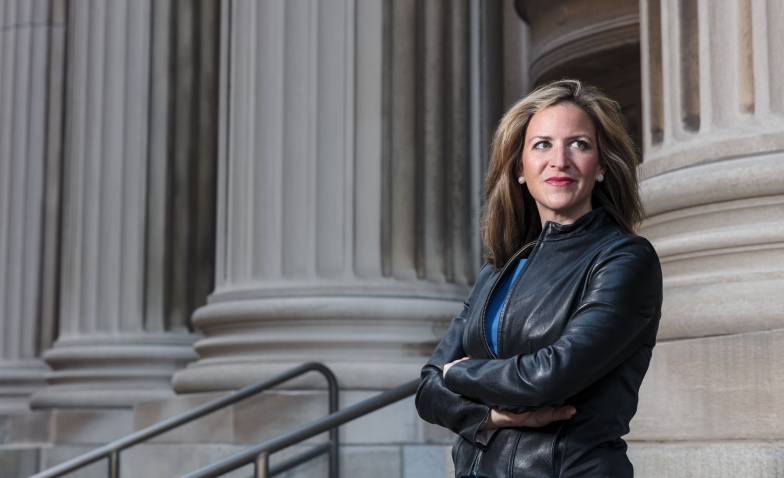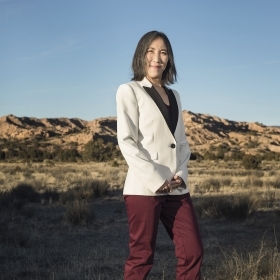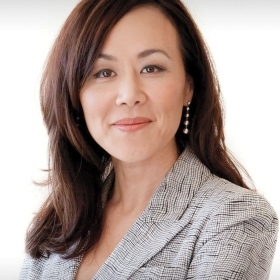Photography by Brad Ziegler
Just over a month after the final votes were cast in the 2020 election, Jocelyn Benson ’99 was at home in Michigan, decorating her house for Christmas on a Saturday night with her young son. Outside, dozens of protesters descended on her home shouting obscenities into bullhorns. Spurred by then-President Donald Trump, they assembled to baselessly dispute the fact that Joe Biden had won her state and the White House.
Benson was targeted in her capacity as secretary of state—Michigan’s top election official. It was her job to run a secure election, which by all measures she did. But the backlash that followed, she says, was not just an attack on her and her family, but also a “tiring and heartbreaking” affront to the millions of Michiganders who had cast their ballots and—no matter who they voted for—should be able to have faith in their state’s election system.
“You see voters being lied to in such a way they believe their vote didn’t count,” she says. “Their votes did count, and their voices did matter.”
The intense reaction to the 2020 election threw Benson, a Democrat, and her work into the national spotlight. She stood by her state’s vote count, and stepped up her own fight for democracy and election security—one she has been engaged in her entire career. She became one of the most vocal election officials in the country, fiercely defending the accuracy and integrity of her state’s results. In a scathing statement the morning after the protesters gathered, Benson declared, “I will stand up every day in my job for all voters, even the votes of the protesters who banded together outside my home.”
It was an unprecedented position for a state secretary of state, but standing up for voters and democracy in unprecedented ways is precisely what she has done at every step of her life and career.
Growing up in Pennsylvania with parents who were special-education teachers, Benson says she saw firsthand how important it is for every person to have a voice.
When she arrived at Wellesley in 1995, she remembers feeling empowered on Day One. She studied political science and was already deeply engaged with constitutional issues, law, and politics.
Professor Emeritus Alan Schechter—who taught thousands of students political science at Wellesley starting in 1962 and ran the Wellesley in Washington program—remembers her as a bold student with “remarkable abilities.”
As a sophomore, she became the first student to be elected to the Wellesley Town Meeting, the 240-member legislative body for the town. Her junior year, she founded the Women in American Political Activism Conference and authored a book chapter on a California congressional rematch. And her senior year, she was selected as one of Glamour magazine’s Top Ten College Women. Wellesley’s statement announcing the honor proclaimed that “Benson plans a career dedicated to ensuring equal access to education, housing, and health care for all citizens. Equal opportunities for women and minorities are issues of special importance to her.”
At Wellesley, Benson says, she came to deeply understand what it means to remove implicit gender bias from the environment. That understanding “puts you in a stronger position to recognize it when it reemerges in just about every other environment and scenario,” she says, “and call it out, and … be emboldened to try to dismantle it.”
The College also instilled “the fire that’s needed to battle those biases and to ensure that we define our own boundaries and accomplishments ourselves … through our own efforts, as opposed to allowing others to impose definitions on us and limit us.”
Passionate about civil rights, Benson both interned and worked at the Southern Poverty Law Center during her college years, investigating white supremacist and other hate groups. She has said it taught her to be fearless and courageous—and drove home how important voting rights are to democracy.
“Being so close to Selma, I saw really clearly how our only constitutional right of equality is tied up with the vote,” she says. “And if that one person, one vote promise in our constitution isn’t a reality for everyone, then everything else is in jeopardy.”
Benson wanted to continue the work of those civil rights “foot soldiers” who risked their own lives to protect democracy.
After Wellesley, she won a Marshall Scholarship to study the ties between hate groups in the U.S. and Great Britain. At Oxford, women made up only 30% of many of her classes, and she came to appreciate her Wellesley experience even more.
Benson says that the 2000 presidential election, which was decided by the Supreme Court due to a razor-thin margin in Florida, was another pivotal moment that deepened her desire to maintain and improve the nation’s election system. That year showed how vital each person’s vote is—as well as the importance of safeguarding the electoral process. The 2000 election, she says, “illuminated the fact that there was a lot of work left to be done to make sure democracy was living up to the ideals of its founders.”
She went on to Harvard Law School and later was named dean of Wayne State University Law School at 36, the youngest woman in U.S. history to lead a top-100 law school.
In 2018, she was elected Michigan’s 43rd secretary of state, assuming office on Jan. 1, 2019, and calling it “the greatest honor of my life.”
Schechter says Benson was “totally prepared for that job. She knew more about that job than probably anybody else coming in.” In fact, she had written an entire book on state secretaries of state by then, interviewing 30 of them. “Voters can’t forget that they hold the keys to ensuring that their state’s chief elections official oversees the election process in a fair, transparent, and judicious manner,” she wrote in State Secretaries of State: Guardians of the Democratic Process. “It is my hope that this book will leave voters and engaged citizens better prepared to actively embrace their role as the ‘employers’ of these Secretaries of State.”
Schechter has relished watching his former student continue to keep her core values on every path she has taken. “She’s just so committed to doing the right thing in terms of expanding the ballot, particularly for those Americans who are less likely to be able to go out to vote,” he says.
Just as Schechter followed her through last year’s firestorm, so, too, did many in the Wellesley community. Benson heard from former classmates and others affiliated with Wellesley, cheering her on in her work. Deep bonds are created in college, she says, and they “carry you throughout life.” When President Trump started attacking her and other top government officials in Michigan, she drew deeply on those relationships. “That’s really when the sisterhood emerged,” she says. “The strength and the gumption that was needed at that moment to stare down the president of the United States when he was bullying us came from the fire that really was ignited in the Wellesley experience.”
“What incredible courage,” Schechter says. To him, Benson embodies “that whole Wellesley motto of be bold, be bold, don’t just passively comment about things in the world or in our culture, our society, but do something.”
In the middle of that turbulent December, Benson heard that the 6-year-old daughter of Tracy Prout Bunye ’00 was “obsessed” with her and loved the leather jacket she had seen her wear in media interviews. The daughter, Alice Bunye, soon received a package in the mail—a leather jacket in her size with a message from Benson to “stay strong, dream big, and be you.”
Alice wore her jacket with pride the next day, and nearly every day since, to, in her words, be “fierce and strong like Jocelyn.”

Photo by Kent Nishimura / Los Angeles Times via Getty
Before Election Day, Benson’s office had spent months batting back misinformation about the election.
“We were very, very aware that misinformation would be the greatest threat,” she says.
Benson’s office had set up a robust fact-checking operation, including a website, to quickly respond to false claims that surfaced about the election, especially about absentee ballots. The site let voters know, for example, that deceased voters’ ballots were not counted, that the election was certified by a bipartisan group, that voting machines were accurate, and that ballots could take multiple days to count, but having to wait for the results did not mean anything was wrong.
“Our focus was on fighting that battle,” she says, “and protecting the security of our election throughout Election Day, through the tabulation. That was work we did successfully.”
The coronavirus pandemic had reached Michigan just after the state held its presidential primary on March 10, 2020. Benson went into high gear to come up with a plan to allow Michigan voters to cast ballots without needing to do it in person. As a result, Michigan had one of the most proactive plans in the country. Absentee ballot applications were mailed to every resident, ensuring voters had access to an alternative to in-person voting. In the end, the state had one of the highest turnout rates in the country for the presidential election—above 70%.
But change is not always understood, and the shift opened a lane for disinformation about the ballots to seep in.
In May 2020, President Trump falsely tweeted that Michigan sent out absentee ballots to all its residents, calling Benson a “rogue Secretary of State.” He threatened to withhold federal funding from Michigan.
In a tweet that echoed around the country, Benson shot back: “Hi! [Waving hand emoji] I also have a name, it’s Jocelyn Benson. And we sent applications, not ballots. Just like my GOP colleagues in Iowa, Georgia, Nebraska, and West Virginia.”
When Election Day came, there was intense focus by voters and the media on ballot counting, especially in crucial states like Michigan, where the margin was expected to be tight. In Detroit, Trump supporters gathered to watch as absentee ballots were being counted.
Joe Biden was declared the winner of the state a day later. What followed was an unprecedented effort to dispute the results in Michigan and elsewhere. “What we didn’t anticipate,” Benson says, “is the real uptick in efforts to lie to the electorate.”
“It was like thinking the battle was going to end the week of the election. And then slowly realizing the battle wasn’t over,” she says. “Every week or every day would begin anew with hope that things were settled. The facts were clear, so why are we continuing to litigate them?”
As Trump and his supporters intensified their election falsehoods, Michigan’s election system landed squarely in their sights once again. In October, Gov. Gretchen Whitmer had been the target of a kidnapping plot by a far-right militia group, and after the election, Trump and his team filed lawsuits against the state to try to change the election results. The lawsuits failed, and Benson held her course. The morning after the election, she held a press conference to reassure residents that in-person voting had been “exceptionally smooth.”
What was “challenging and heartbreaking,” she says, was seeing the “noise escalate week to week.”
“We won every battle—we got state certified, every legal case was dropped, and it just kept spiraling in a direction of unfortunate exacerbation,” Benson says.
One month after protesters had threatened her family, that spiral tragically culminated on Jan. 6 as rioters stormed the U.S. Capitol in an unsuccessful attempt to block Congress from tallying the electoral votes.
In the end, of course, President Biden was sworn in on Jan. 20. But Benson’s fire to protect democracy burns stronger than ever. What the country should take from this election and try to replicate and build on, she says, are the successes Michigan and other states had in allowing more people than ever to smoothly vote in person and by mail in the presidential election. She refuses to allow the “everything happened after the polls closed” claims to influence her work moving forward. The noise, she says, “can’t become the norm.”
By February, Benson was out in the spotlight again, urging her state’s lawmakers to pass sweeping, ambitious election reforms, including making Election Day a state holiday, requiring absentee ballot applications to be mailed to all registered voters every federal election cycle, banning firearms in polling places, and allowing extra time for counting ballots.
For now, she is focused on telling what she calls the true story of the 2020 election, and continuing to respond to misinformation “at every corner and every turn.” And, she adds, letting the facts and the truth guide her.
Amita Parashar Kelly ’06 is a politics editor at NPR who does not, at the moment, own a leather jacket.









We ask that those who engage in Wellesley magazine's online community act with honesty, integrity, and respect. (Remember the honor code, alums?) We reserve the right to remove comments by impersonators or comments that are not civil and relevant to the subject at hand. By posting here, you are permitting Wellesley magazine to edit and republish your comment in all media. Please remember that all posts are public.